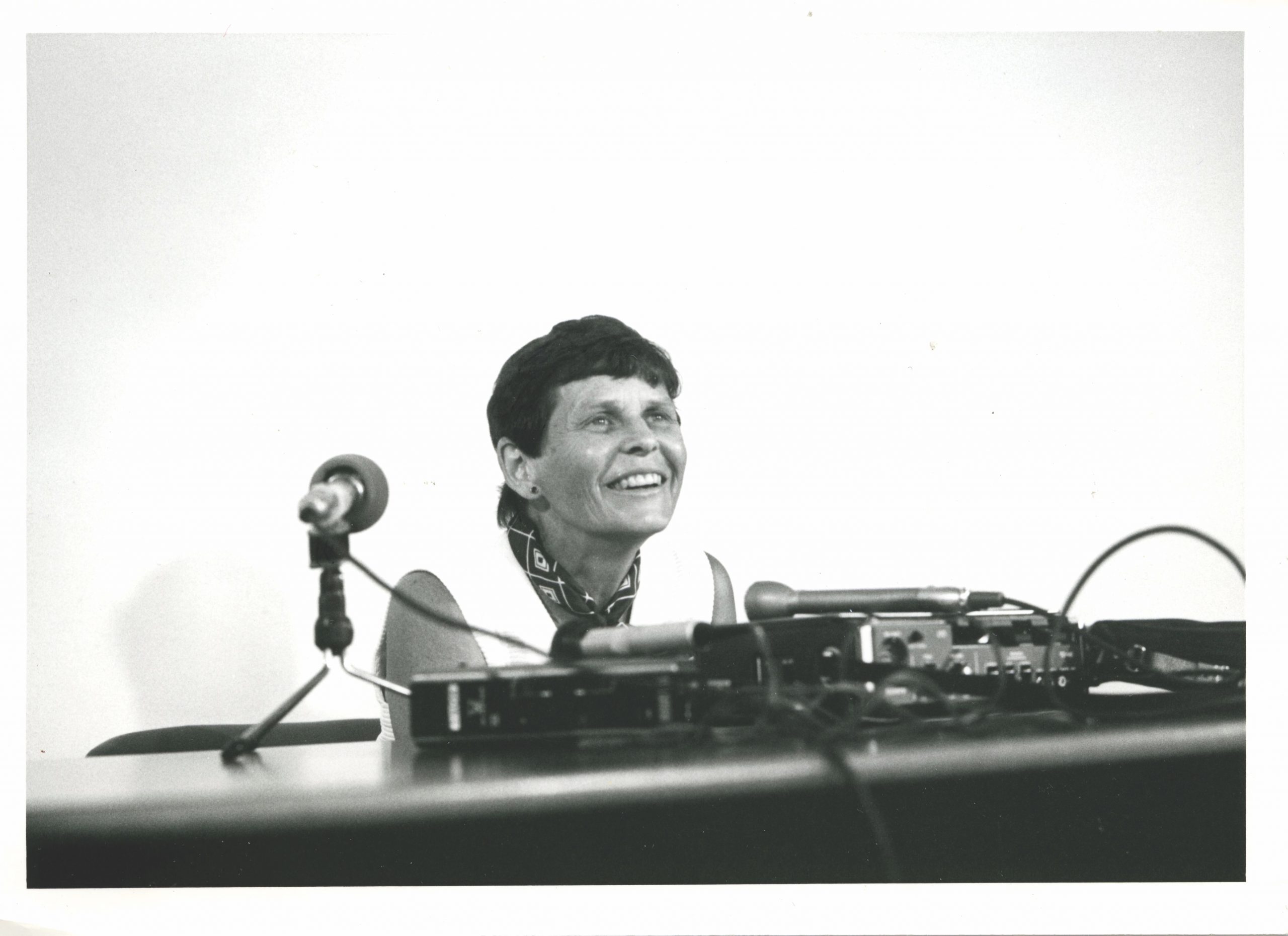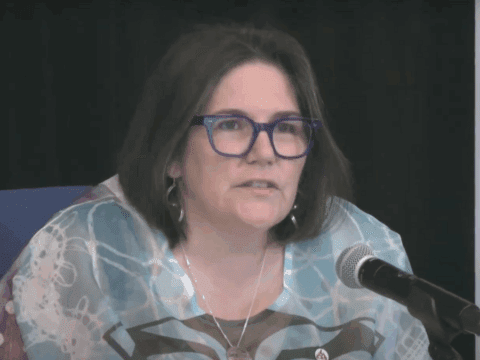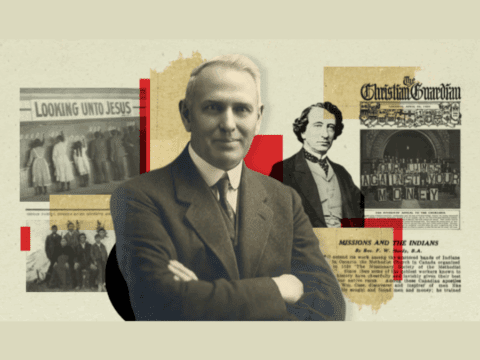Why buy a new pot if the old pot still boils water? Why take a cab if you can walk the distance? Among her closest friends — Bruce Mutch, John and B.J. Klassen, and Dorothy Wyman — Very Rev. Lois Wilson’s frugal nature is legendary.
Dorothy shares that whenever Lois came to visit her in Mississauga, Ont., just to the west of Toronto, she took public transit. If Dorothy suggested that she take a taxi, Lois would balk: “Why would I do that when I can ride the subway and buses for less than three dollars each way?” Mary Sanderson offers some insight about what many consider Lois’s frugal nature (especially when it comes to her attire): “Lois is unusual; she never cares particularly about what she looks like or what she’s wearing. It’s the cause that she contributes to — that’s what she cares about.”
Former CGIT (Canadian Girls in Training) canoeist Joan Halonen concurs, but she also chuckles over the phone as she discusses Lois’s thrifty nature: “Lois isn’t frugal, she just knows that we in the West have too much and too many things that we don’t need, while there are so many others who have nothing. . . . Things are not important to her. She is more interested in world affairs, community and social justice — human rights for all.”
During her tenure as moderator of the United Church, Lois’s leadership model involved extensive travel. Lois understood that unless the church became familiar with the context of “the other” by being on the ground in other countries, it was bound to do mission and ministry “all wrong at home.” Through her travels as moderator and in ecumenical leadership positions, she wove a web of connections across the globe. And she was clear that any learning and practical experience she acquired had to be shared whenever she spoke at home or abroad.
Many church members and a few of the church’s executive staff felt that she was spending too much of the church’s financial resources on her travels. In an effort to set the record straight, however, Lois shares that all of her visits abroad were by invitation from the host country or organization and all were billeted.
Several people interviewed note that Lois didn’t travel simply for the sake of it and that she spent very little on those visits abroad. Lois stayed mostly in people’s homes, accepting their bed-and-breakfast hospitality.
As the spiritual head of the United Church, Canada’s largest Protestant denomination, Lois often appeared unfashionably dressed — even, at times, a bit dishevelled. She’d carry important documents and diplomatic church papers in a plastic shopping bag. Lois says she found briefcases too awkward and heavy: “They weigh at least 10 pounds before you get anything in them.”
Given her attire, she was sometimes mistaken for a bag lady entering the main lobby of Church House, the United Church’s main offices, then at 85 St. Clair Ave. East in Toronto. More than once, Lois was stopped by the church’s security guard, who, to his embarrassment, was unable to recognize her as the head of the church and would request proof of identification. Once he even called Rev. Don Ray, the general secretary, to confirm her identity.
While the church did provide a stipend for the moderator’s accommodations and expenses, Lois nevertheless made friends with a generous United Church member who had an apartment around the corner from the church’s head office and gave her use of it when she was out of town. This also allowed Lois to make her own meals — often peanut butter sandwiches.
However, there were occasions when Lois needed to be in Toronto and the apartment was unavailable. Rev. Nancy Hardy recalls the odd time when Lois slept on the sofa in her moderator’s office. She kept two unironed dresses in her cupboard and would get up in the morning and splash her face with water in the ladies’ washroom down the hall. She’d head back to her office, close the office door, head into her cupboard, close the cupboard door behind her for additional privacy and change into one of her dresses. Then she’d come out, ready to chair a meeting.
These habits would continue when Lois was appointed to the Canadian Senate (1998-2002). During Lois’s first few months as a senator, she stayed with her son Neil in his Ottawa home. Lois, of course, did not submit an expense claim for accommodations, because she was staying with her family. She later found a bed and breakfast in downtown Ottawa — the Albert House Inn — which to her was the most natural of accommodations.
Lois’s former Senate staff say that, having worked with other senators and members of Parliament, they were continually shocked by how little she spent and expensed. Raised by a father who took pay cuts in the hope that the funds would be diverted to support those less fortunate, and a mother who could split a can of peaches seven ways, Lois is always mindful of what she spends and whose money she is spending, be it church donors’ or the Canadian taxpayers’.
As her legal researcher, David Schneider, expresses, “Senator Wilson travelled between her home in Toronto and Parliament Hill by train; much less expensive than flying, and it afforded her the opportunity to work while she travelled. . . . And Senator Wilson walked everywhere with her backpack, from her lodging to the Senate, while other senators took taxis to travel shorter distances.”
David speaks fondly of Lois’s small stature and her focused walking style. She’d head from her office across to the Senate chamber with all of her papers in her backpack. He mentions too that Lois was most often rather plainly dressed. He laughs, noting that because of her appearance and the fact that she had not been driven up to the Hill, she was often not recognized as a member of the Senate of Canada. And on several occasions, much to the embarrassment of the Senate Protective Service, they asked Lois to produce her identification. She’d graciously oblige, sometimes with a chuckle.
For those in Lois’s close circles, her generosity is also legendary; dare it be said, she is extravagant. She lives her priorities on her terms. Lois is extravagant with others, with her time, her energy and her quiet philanthropy. Callie Archer, a friend and colleague, says all of Lois’s income from the Senate went “to some sort of scholarship fund. . . . It’s for women in the developing world working in theology to come to Canada and study, to do a PhD.”
In an e-mail, Lois confirms this to be the case; though she notes that it was most of her income from the Senate and not her entire salary. The funds are in a planned giving vehicle administered by The United Church of Canada and will be realized for those scholarships upon her death.
Lois doesn’t stay at inexpensive lodgings to make a point or even for her choice to be noticed. She simply believes we in the West accumulate consumer products at great expense to ourselves, our relationships, the world and our planet. Lois very much enjoys friends and family, interesting conversation, being offered a meal, sailing, canoeing, camping, the symphony, the opera and the theatre too. She relishes a good laugh and story, and being in nature — totally free.
These attributes can be hard to find in any political or religious leader in our current climate. In some instances, positions of trust have been taken by individuals at the expense of others, be they donors, congregants or ordinary citizens. This happens here in Canada and in governments and organizations around the world. Whether Lois is in the role of the so-called leader or the servant — the Canadian senator, the United Church moderator or the bag lady being stopped by security — she is one and the same person.
Excerpted and condensed from Feisty and Fearless: Glimpses into the Life of Lois M. Wilson by Janice L. Meighan. Reprinted with permission from the United Church Publishing House.
***
This story first appeared in The United Church Observer’s April 2014 issue with the title “A no-fuss moderator.”














